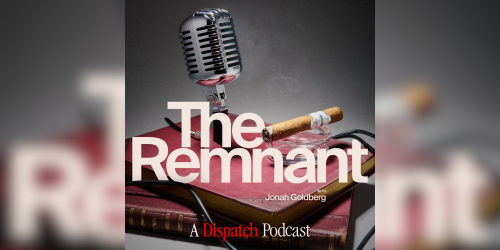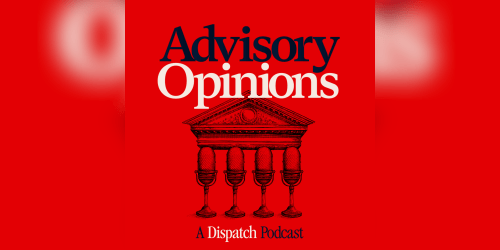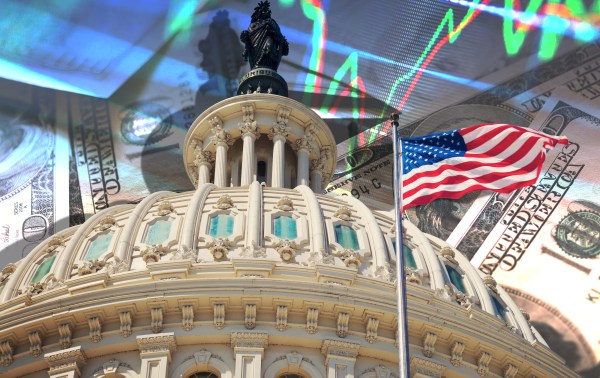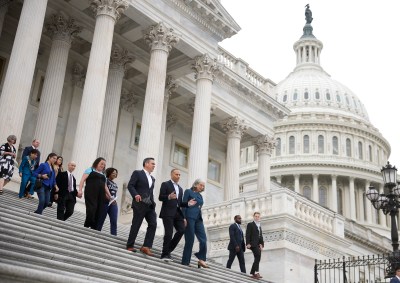Turn any article into a podcast. Upgrade now to start listening.
Premium Members can share articles with friends & family to bypass the paywall.
Happy Wednesday! We’re excited to announce Dispatch Energy, our newest weekly newsletter, presented by Pacific Legal Foundation, which dives into the politics, policy, and innovation shaping America’s energy future. Featuring a rotating roster of contributors who are experts in their respective fields, each edition will feature incisive analysis on everything from oil and gas and permitting regulations, to renewables, climate, and the grid. We’ll launch our first edition on Thursday—sign up to receive it here.
Quick Hits: Today’s Top Stories
- The federal government entered a shutdown at 12:01 a.m. Wednesday, after Democratic and Republican leaders failed to agree on a spending bill to extend funding into the new fiscal year that begins today. The impasse centers on Republicans’ push to fund the government through November 21 at current levels and Democrats’ demand to extend Affordable Care Act health care subsidies, which expire at year’s end. President Donald Trump held a meeting with congressional leaders Monday, but Vice President J.D. Vance said afterward the government appeared headed to a shutdown. Hundreds of thousands of federal workers face furloughs, while active-duty military and law enforcement will continue working without pay until the shutdown ends. To learn more, read today’s full story below.
- Defense Secretary Pete Hegseth and President Donald Trump hosted a meeting Tuesday with senior military officials at a Marine Corps base in Quantico, Virginia, in which Hegseth outlined 10 new directives for the military, including stricter physical fitness and grooming standards, with combat troops required to meet the highest male standard on fitness tests, an overhaul of internal oversight offices, and a review of hazing and bullying policies. “No more identity months, DEI offices, dudes in dresses, no more climate change worship, no more division, distraction or gender delusion, no more debris.,” Hegseth said. “I’ve said before and will say again we are done with that s—.” Trump praised the reforms and said his administration has committed to spending more than $1 trillion on the military in 2026, adding that he would fire generals “on the spot” if he disliked them. He also suggested using some U.S. cities as training grounds for the military and National Guard.
- An unknown number of Indonesian students remain trapped under rubble after their school collapsed during afternoon prayers on Monday. Six are confirmed to be alive under the rubble, but at least three students have died, and more than 100 others were injured, with 91 more unaccounted for. Most of the trapped students are boys ages 12-18 and. More than 300 rescuers were working to rescue them.
- A magnitude 6.9 earthquake struck near the central Philippines late Tuesday night, killing at least 69 people and injuring nearly 150 others. The shallow quake struck near Bogo City in Cebu Province at 9:59 p.m., collapsing houses and overwhelming the local hospital with casualties. The Philippines sits along the Pacific Ring of Fire, where earthquakes and volcanic activity are common.
- At least 10 people were killed in Pakistan’s Balochistan region on Tuesday following a suicide car bomb explosion outside the headquarters of a paramilitary group. The dead included eight civilians and two paramilitary personnel, and another 33 people were injured. Balochistan Chief Minister Sarfraz Bugti said a suicide bomber was driving a pickup truck at the time of the blast, and, in the direct aftermath, four gunmen attempted to storm the paramilitary group’s building, but were shot and killed by security officers.
- Polish law enforcement officials arrested a Ukrainian diver suspected of sabotage in the September 2022 explosion of the Nord Stream gas pipeline that runs from Europe to Russia, both the suspect’s lawyer and German prosecutors confirmed on Tuesday. Germany issued an arrest warrant in June 2024 for the suspect, identified only as “Volodymyr Z,” though he has no known connection to Ukrainian President Volodymyr Zelensky. “My client does not agree with this and says he’s not guilty,” the suspect’s lawyer, Tymoteusz Paprocki, said on Tuesday.
- The White House withdrew its nomination for E.J. Antoni to head the Bureau of Labor Statistics, three sources told CNN Tuesday. Antoni’s nomination faced mounting opposition in the Senate after reports revealed his deleted Twitter account featured sexually degrading attacks on Kamala Harris and conspiracy theories. GOP Sens. Susan Collins and Lisa Murkowski had declined to meet with Antoni. Trump nominated Antoni in August after firing the previous BLS commissioner over disputes regarding jobs data.
- Democratic California Gov. Gavin Newsom signed legislation on Tuesday to impose safety regulations on AI companies, including requirements that they document and share their safety protocols with the public, as well as protections for employee whistleblowers. In a statement on Tuesday, Newsom described that bill, S.B. 53, as “first-in-the-nation frontier AI safety legislation that builds public trust as this emerging technology rapidly evolves.” The same day, OpenAI released its new Sora 2 AI video generation model, along with a social media app of the same name, which allows users to generate, remix, and share AI videos. As the Wall Street Journal reported on Monday, citing “people familiar with the matter,” OpenAI had been informing talent agencies and studios that the AI technology in Sora would not request permission to use their work in developing videos, and that entities would have to send the company an opt-out request.
- The Trump administration and pharmaceutical company Pfizer announced a deal on Tuesday that both sides said will lower drug prices, and create a website—to be made available later—for consumers to purchase drugs directly from manufacturers, which will be named “TrumpRx.” According to senior administration officials, the White House aims to launch the website by early 2026. Pfizer said in a statement that “the large majority of the Company’s primary care treatments and some select specialty brands will be offered at savings that will range as high as 85% and on average 50%.”
- Venezuelan President Nicolás Maduro signed a decree on Monday that would significantly expand his executive authority in the event of an invasion by U.S. forces, giving him the power to mobilize the country’s military, control public services, and oversee oil companies. In a televised address on Monday, Venezuela’s dictator added that he is in the “consultation process” of declaring a state of emergency “should Venezuela be attacked by the U.S. empire.” Citing unnamed U.S. officials, the New York Times had reported that senior Trump administration leaders had considered a plan to oust Maduro from power and that support for such a decision “has intensified in recent days.”
- Republican Gov. Jeff Landry of Louisiana said on Tuesday that he sent a letter to Defense Secretary Pete Hegseth, requesting that as many as 1,000 National Guardsmen be activated “to assist with public safety across our state.” If deployed, National Guard troops would assist with logistics and communications work, in addition to assuming law enforcement responsibilities in areas with high crime rates, including cities such as New Orleans, Baton Rouge, and Shreveport, the governor said. “Who would not want help in combating criminals on your streets?” Landry told Fox News’ Sean Hannity on Monday.
- Afghanistan’s Taliban regime issued a nationwide internet blackout on Monday in what it said was part of a crackdown on “immoral activities.” The ban extended even to cell service, and several flights into its capital city, Kabul, were canceled on Tuesday. One unnamed Taliban official told the Washington Post that the decision has already caused severe strain. “We can’t live without the internet,” he said. “Everything is at a standstill at the moment.”
- A federal district judge ruled on Tuesday that the Trump administration’s decision to deport international students for pro-Palestinian activism and anti-Israel sentiments is illegal under the First Amendment. “The effect of these targeted deportation proceedings continues unconstitutionally to chill freedom of speech to this day,” Judge William Young wrote in a 161-page opinion. He further ruled that the administration’s determination of antisemitism was too broad. Later that day, a federal judge disqualified Acting U.S. Attorney Sigal Chattah in Nevada from supervising four criminal cases, ruling that she is not validly serving in that role because her 120-day interim appointment expired in July. The decision marks the second setback for the Trump administration’s efforts to extend the authority of handpicked prosecutors beyond legal limits.
A message from The Dispatch
Stay Ahead of the Curve With Dispatch Energy
The Dispatch’s newest weekly newsletter will dive into the politics, policy, and innovation shaping America’s energy future, presented by Pacific Legal Foundation. Featuring a rotating roster of contributors who are experts in their respective fields, each edition will feature incisive analysis on everything from oil and gas and permitting regulations, to renewables, climate, and the grid.
Out of Office

It happened. As the clock struck midnight, Republicans and Democrats in Congress had failed to come to an agreement to fund the federal government, triggering the first shut down since 2018.
Federal agencies will begin furloughing nonessential employees and pausing nonessential functions, while essential services, such as law enforcement and Social Security payments, will continue. Federal workers who need to report to work will not receive pay until the shutdown ends, and national parks are likely to close temporarily.
As a non-paying reader, you are receiving a truncated version of The Morning Dispatch. You can read our full item in the members-only version of TMD.
There have been some close calls leading up to this point. In December, Republicans and Democrats reached an initial agreement to keep the government open just days before its deadline that month—only for Republicans in the House of Representatives to rebel, arguing that the agreement contained too many extraneous measures. Incoming President Donald Trump then asked Congress not only to avert a shutdown but also to raise the debt ceiling in the process—a tall task because spending hawks usually demand that spending cuts be passed along with any increase. As expected, fiscal hardliners voted with Democrats to kill that bill. Finally, Congress agreed on a slimmed-down bill to avert the shutdown, which did not include the debt ceiling measure, passing it in the nick of time.
But that law only extended spending until March. By that point, Republicans controlled both chambers of Congress, unlike in December when they only had the House. So the question was whether Senate Democrats would filibuster the Republican bill to keep the government open. Ultimately, though, there was no filibuster, and enough Democrats joined Republicans to advance the bill. Senate Minority Leader Chuck Schumer led the capitulation, drawing the ire of his party’s base.
The question heading into Tuesday evening’s vote was whether Democrats would surrender again. Almost two weeks ago, the House passed a stopgap spending measure that would have extended the government’s current funding levels until November 21. The strategy of House Speaker Mike Johnson and Senate Majority Leader John Thune—just like in March—was to dare Democrats to block it. The two Republicans met with Trump, Schumer, and House Minority Leader Hakeem Jeffries at the White House on Monday, but made no significant progress toward an agreement.
That was the state of play as the Senate met Tuesday to consider the House’s continuing resolution, which needed 60 votes to pass. Although House Democrats showed up to make a statement, Johnson did not call his Republican caucus to Washington, D.C., making it so that the Senate either needed to accept his chamber’s bill or shut things down. Democrats chose the latter. While three Democrats voted for the resolution, it did not garner the 60 votes it needed to pass.
The way out is unclear.
The Democrats have technical and funding-related demands, including reforms to the recissions process; but their refusal to budge mainly comes down to health care reform. In the lead-up to the funding deadline, they demanded Republicans negotiate policies such as extending tax credits for people who buy health insurance under the Affordable Care Act (ACA), which are set to expire at the end of this year. Democrats argue that it is necessary to address the issue now rather than in December because open enrollment season is underway, and some insurers have already sent notices to people on the program indicating that their rates are set to increase next year.
However, their counterproposal contained not just a permanent extension of those tax credits, but also a repeal of the changes to Medicaid that Republicans made in the One Big Beautiful Bill Act (OBBBA) passed in July. The repeal of the OBBBA health care provisions alone would cost more than $1 trillion over the next 10 years, with the ACA tax credit extension adding even more on.
Even on Tuesday morning, Jeffries wasn’t budging from those asks. “Our position is a simple one: Cancel the cuts, lower the cost, save health care,” he said at a press conference that featured speeches from people who depend on federal health care programs. “That’s what this fight is all about. We’re here. We’re ready. We’re willing and able to find a bipartisan path forward to fund the government in a way that actually meets the needs of the American people in terms of their health, their safety, and their economic well-being.”
Republicans said they were willing to work with Democrats on the possibility of extending the ACA tax credits, passed in 2021 in response to the COVID-19 pandemic, but they would do so independent of appropriations. “We’re happy to sit down and talk about these other issues that they’re interested in, but it should not have anything to do with whether or not, for a seven-week period, we keep the federal government open,” Thune said at a press conference Tuesday afternoon.
Both sides are refusing to budge from their positions, and Republicans especially have little incentive to do so. As The Dispatch previously detailed, the dynamics of a shutdown heavily favor Trump. With essential functions of the executive branch continuing, there may be some interruption for the White House, but it is unlikely that anything will substantially affect his ability to put his agenda in place through executive action.
Additionally, federal workers, traditionally a Democratic constituency, don’t get paid during a shutdown, and Trump is vowing to make this one especially painful for them. Last week, the Office of Management and Budget sent a directive to federal agencies to begin the process of mass firings in the event of a shutdown. Trump on Tuesday morning did not say how many federal workers he planned to lay off, but he said he was open to putting quite a few out of work. “We may do a lot, and that’s only because of the Democrats,” he told reporters.
The prospect of mass firings was what got Schumer and other Democrats to fold in March, but Schumer dismissed those concerns this time, saying Trump would fire federal workers with or without a shutdown. “The bottom line is, he’s doing it anyway. They’ve already cut 300,000 people … It will fall on him, as I said. He’s the one doing the firings, not Democrats,” he said at a Tuesday press conference.
Rep. Jamie Raskin, the top Democrat on the House Judiciary Committee, argued Trump did not have the authority to go through with his plans and that Democrats and their allies could oppose him with lawsuits. “The Trump people don’t like to hear it, but they are governed by law,” he told TMD. “They are governed by the civil service requirements. They are governed by all of the federal protections that we have for federal workers.”
The next few days—or weeks—will show how much Democrats are able to bear the pain that federal employees will endure during this shutdown. Unless Democrats settle for the continuing resolution they have already rejected, the House will need to come back and approve an alternative both parties can agree to. But it remains unclear whether Johnson plans to bring his members back.
Whether House Republicans need to come back to pass an agreement or not, it is unclear how long the shutdown will last and what concessions each side needs to make. Democratic Sen. Chris Murphy of Connecticut put the onus on the GOP to offer his party something it can accept.
“They have only offered a partisan [continuing resolution], and they’ve refused to meet with Democrats,” he told TMD. “The path out of this is to sit down and talk.”
Today’s Must-Read
The U.S. dominates the world’s list of the most valuable companies. Indeed, of the top 20 publicly traded companies today by market cap, 17 are American. This reality—derived partly from policy and partly from lucky historical circumstances—is an economic boon for our country, improving the lives of Americans across the socioeconomic spectrum. To protect and expand this advantage, policymakers should seek to curb regulations hostile to global business.That more valuable companies are founded and grown in the U.S. than in other countries is no surprise; the U.S. is the world’s richest large country, and its largest rich country. That said, the share of the world’s greatest companies that call the United States home is disproportionate, even accounting for its size and wealth. Understanding why this is the case is crucial to ensuring that it remains so.
Toeing the Company Line
Patton for Dummies
The military under nationalism.
Hegseth’s Audience of One
The defense secretary gathered generals from across the globe for a speech aimed solely at the commander in chief.
Unmined Diamonds
Botswana serves as an example of how not to use human resources.
What Does It Even Mean to Be an ‘Independent’?
More Americans are identifying as such, but the term tells very little about what they believe.
What We Got Wrong in September
A list of corrections issued by The Dispatch last month.
Parenting in the Modern Age | Interview: Emily Oster
Don’t screw up the first three years.
Selective Prosecutions
‘Everything about this was reeking of politicized prosecution.’
Worth Your Time
- Last Sunday was tough for members of the Church of Jesus Christ of Latter-day Saints. They woke up to learn that Russell M. Nelson—leader of the church, and considered a prophet of God—had died the night before, at 101 years old. Then, just a few hours later, news arrived of a shooting at an LDS church in Michigan. While the internet became grim and partisan, McKay Coppins (himself a Mormon) writes in The Atlantic that he spent that moment wondering what Nelson would have thought: “How would he have responded to the horrific violence in Michigan if he’d lived one more day? I doubt the shooter’s motives would have changed his answer. I suspect that Nelson—who spent his final years urgently pleading with Latter-day Saints to be peacemakers in a fractious and angry world—would have reminded us of that most radical, and unnatural, of Christ’s teachings: to love your enemy.”
- Coworking office space provider WeWork was beloved, well funded, very ambitious, and—eventually—an imploding disaster. In a blog post, economic historian Dror Poleg argues that the world’s leading artificial intelligence company looks very similar to it: “Users love ChatGPT, and its user base has grown from zero to more than 700 million within less than two years. And OpenAI’s revenue has been exploding, but so have its costs. As The Information reports, the company generated $4.3 billion in sales during the first half of 2025, but it spent $6.7 billion on research & development. In total, OpenAI lost $13.5 billion during the period.” Poleg argues the few fundamental differences are not flattering. For example, while WeWork had a lot of up-front costs, which were amplified by upkeep expenses, OpenAI has to spend far more, and has to continue spending at that rate for the foreseeable future. Plus, AI is a far more competitive space. “OpenAI claims that the ChatGPT brand is powerful,” Poleg writes. “It’s true: ChatGPT has become synonymous with AI. But the same was true for WeWork. In fact, even today, more people search for ‘WeWork’ than for ‘coworking’. But being top of mind did not prevent WeWork’s valuation from crashing from $47 billion to bankruptcy.”
Presented Without Comment
Associated Press: FBI Boss Kash Patel Gave New Zealand Officials 3D-Printed Guns Illegal To Possess Under Local Laws
Also Presented Without Comment
Telegraph: [Britain’s National Health Service] Must Apologise for Guidance on Marrying Cousins, Wes Streeting Says
The Health Secretary said the advice “should never have been published” because the practice causes “genetic defects”. The NHS has since withdrawn the guidance, published by its Genomics Education Programme, which claimed first-cousin marriage is linked to “stronger extended family support systems and economic advantages”.
Also Also Presented Without Comment
Buenos Aires Times: Pre-Election Show: Milei Plans Musical Book Launch Bonanza at Movistar Arena
President Javier Milei will look to kickstart his party’s election campaign with a large rally at the Movistar Arena in Buenos Aires next month. Milei, 54, will promote his new book – the humbly named La construcción del milagro (“The construction of the miracle”) – with a speech at the October 6 event, which will be open to the public…. According to reports, Argentina’s President is drawing up a list of musical numbers – some with political connotations – that he will perform at the event.
Let Us Know
Have any thoughts or questions about today’s newsletter? Drop us a note in the comments!
Correction, October 1, 2025: This newsletter has been updated to clarify the rescission reforms have been requested during this shutdown fight.



















Please note that we at The Dispatch hold ourselves, our work, and our commenters to a higher standard than other places on the internet. We welcome comments that foster genuine debate or discussion—including comments critical of us or our work—but responses that include ad hominem attacks on fellow Dispatch members or are intended to stoke fear and anger may be moderated.
With your membership, you only have the ability to comment on The Morning Dispatch articles. Consider upgrading to join the conversation everywhere.